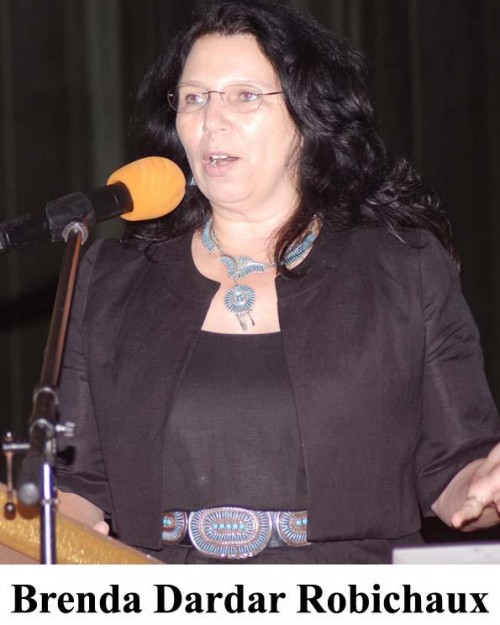March 21: 33rd annual Over and Under 5K Tunnel Run and Heart Health Expo (Houma)
March 9, 2009March 12
March 12, 2009The Federal Communications Commission approved last month one of two applications submitted by the United Houma Nation to build a noncommercial, educational radio station.
The construction permit for a station in Golden Meadow was granted, while the application for a station located in Chauvin is still under review.
The tribe has three years to get a radio station operational before it can receive a broadcasting license.
“That’s the frightening part,” said Brenda Dardar Robichaux, United Houma Nation chief. “It is quite intense to be on this timeline to raise the funds that it’s going to take to build our radio station and have it ready in that time frame.”
The tribe’s advisory board has not decided on a format or established a budget. However, they know it will be expensive.
“I’m thinking $1 million initially just to get a building,” said Nicole Roddy, who is coordinating the radio station project. “Some sample budgets I’ve seen have ranged from $300,000 to $1 million, depending on how deep we want to get involved. “
The Golden Meadow station will serve as the home base and will transmit into southern Lafourche and Terrebonne parishes and to the Gulf of Mexico, where tribe fishermen and members who work offshore can receive the signal.
If the Chauvin application is approved, that station will reach inland throughout Terrebonne Parish and possibly into St. Mary Parish, according to Roddy.
Rather than purchase a radio tower, the tribe will rent space on a tower owned by an oil company to place a transmitter and beam their frequency.
“We have an agreement with Exxon for one of their towers in Leeville that if we did get a permit and a license, we would be able to rent space for that tower,” Roddy said. “We hope to do the same thing in Chauvin.”
NCE frequencies reside on the left side of the FM dial between 88.1 and 91.9 megahertz. The federal government cedes them to nonprofit organizations free of charge.
The United Houma Nation intends to use the radio stations to share and sustain their rich cultural heritage.
Programming will focus on teaching the unique French dialect the tribe speaks, arts and crafts, health, personal finance, discuss community events, some of the challenges the tribe faces and how they are trying to address them and other pertinent issues.
“It’s limitless the possibilities of what we’ll be able to do with our radio stations,” Robichaux, said. “We already have a youth media team conducting interviews with community leaders and tribal elders. They learned how to edit the interviews, and they have already been played on Pacifica Radio out of New York. (The productions have) already played throughout Indian country from Native-based radio stations.”
The idea of starting a community-based radio station surfaced after hurricanes Katrina and Rita scattered many United Houma Nation members throughout the southern U.S.
“We faced great challenges in trying to communicate with our tribal citizens,” Robichaux said. “This will be one of the ways we can communicate with them.”
A group of volunteers from California visited the tribe after the storms and suggested they pursue a radio station. The volunteers built a mock station at the Golden Meadow tribal center and marked it KVHN, Voice of the Houma Nation.
Robichaux, Roddy and others have spent years learning how to build a radio station.
They’ve attended conferences, hired an FCC attorney from Washington D.C. and Florida-based RF Engineers as consultants, secured funding from organizations such as People’s Production House (New York City-based national media education and advocacy organization), Neighbor-Works America (national network of over 240 community development and affordable housing organizations) and others to get the applications done.
The applications were submitted in October 2007. They were placed in what the FCC terms an NX group with other applicants seeking service to the same area.
Late last year, RF Engineers suggested minor changes to the Golden Meadow application, making it a singleton. Once the changes were made, the application was pulled from the group and a permit was issued.
“The FCC decides who gets a license based on a point system,” Roddy said. “The application that has the most points gets the license. By making the Golden Meadow application a singleton, the hope was that the Chauvin application would have the most points in that group and it would be awarded a permit also.”
There is no time frame for when the FCC will make its decision on the Chauvin application.
In the meanwhile, there is money to raise and more about radio for the tribe to learn.
Next month, Robichaux and Roddy will attend the 34th annual Community Radio Conference in Portland, Ore.
The tribe will likely be in a nonstop fundraising mode to get the station running and to keep it going.
“There’s a short-term budget and a long-term budget,” Roddy said. “Our short-term budget is we have to have a radio station in three years. We need to have all these physical things: a building, equipment, a transmitter and an antenna. Long-term, we need personnel to run the radio station and utilities. Since it’s a community-based radio station, we’re going to need volunteers. So, we’re always going to be doing fundraising.”
While the journey to get a radio station has been long and arduous, the tribe has made a smooth transition to their new call sign.
“After we received the permit, our attorney said now we have to apply for the call sign,” Roddy recalled. ” KVHN was already taken by the Coast Guard. They wouldn’t release KVHN, but they did release KUHN. So instead of Voice of the Houma Nation, we settled for KUHN for United Houma Nation.”




